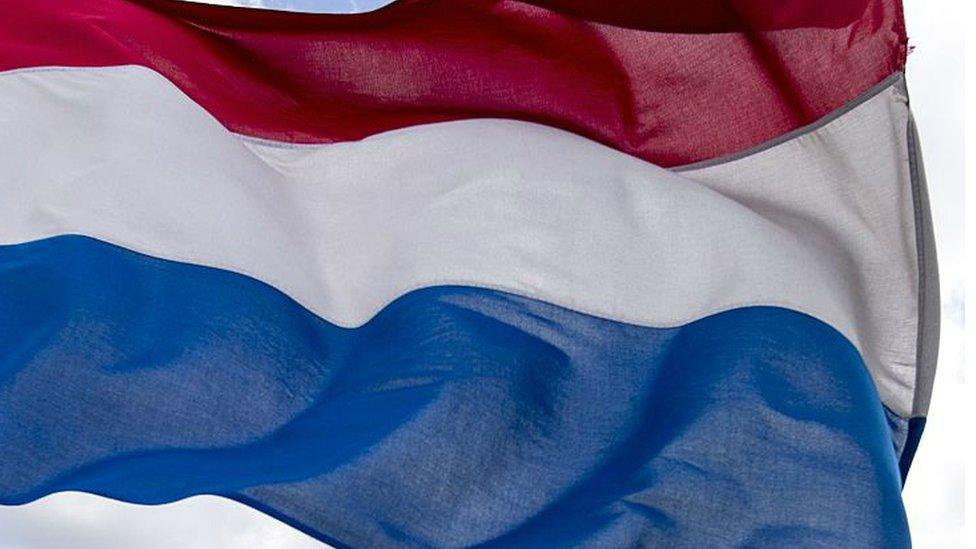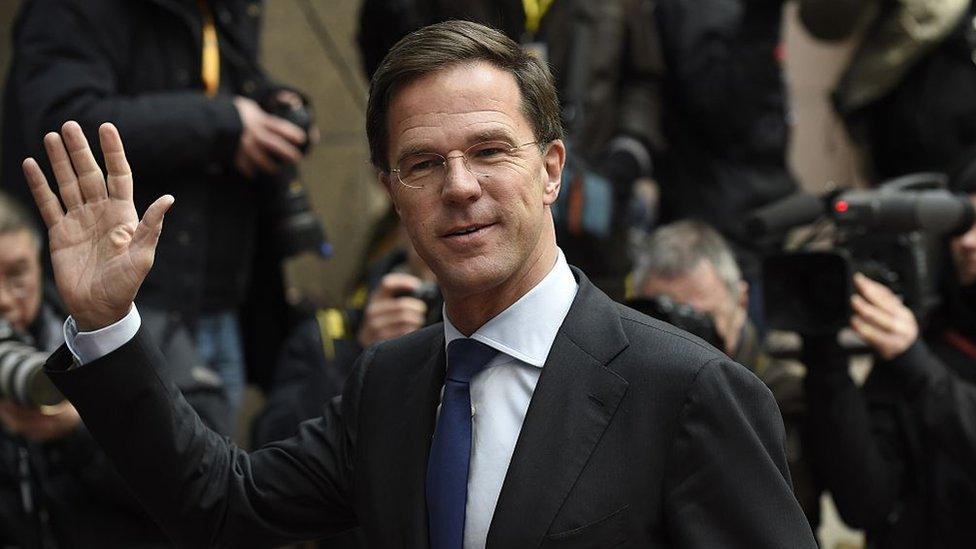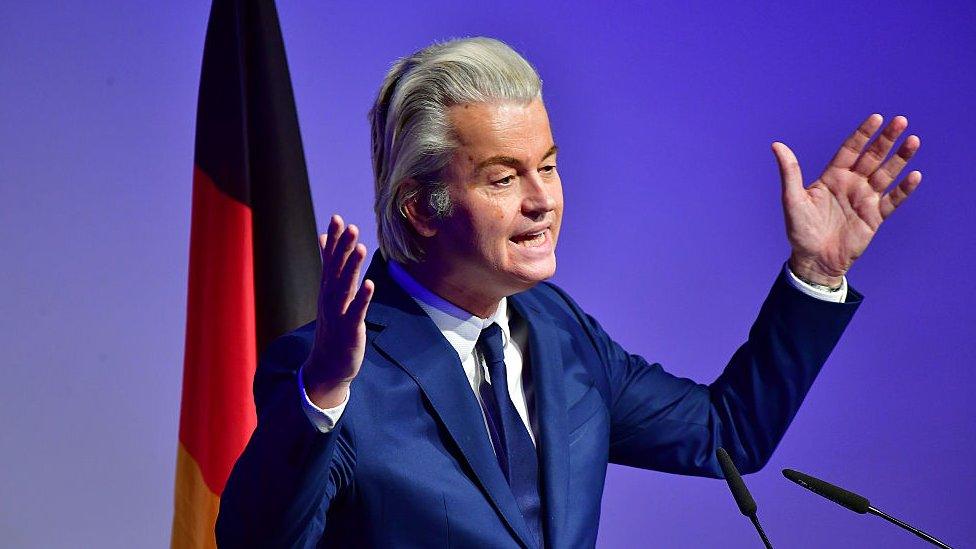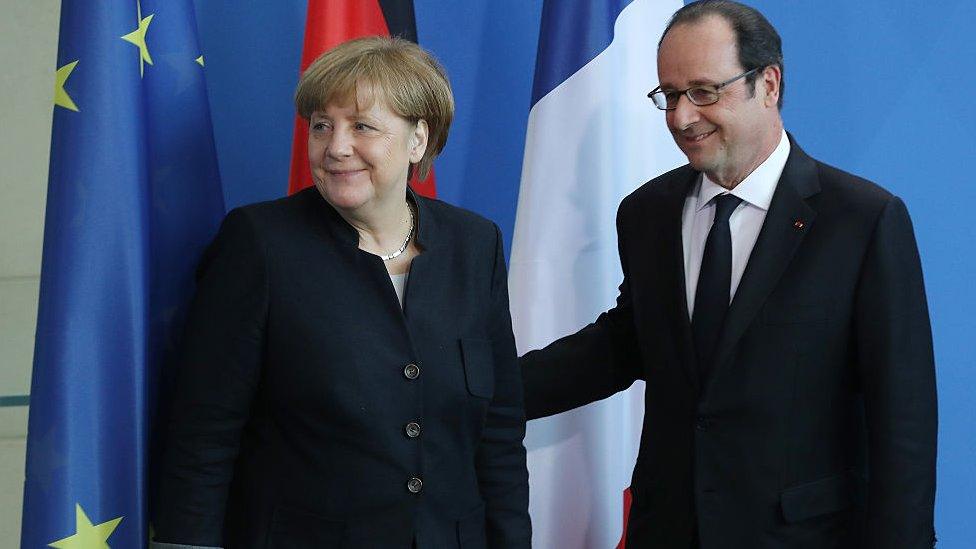The Netherlands' populist moment?
- Published

I ask the Dutch ruling party's Europe spokesman what the election next month is about. "Identity," he replies without hesitation.
I try to ask his leader, the Dutch Prime Minister Mark Rutte, about their strategy.
Near the Dutch Parliament in The Hague, a small crowd gathers in the snow and begins a countdown for Mr Rutte. "Tien, negen, acht" - ten, nine, eight - they chant before he unveils the statue of Johan Rudolph Thorbecke, a 19th-Century statesman, hero to Rutte's Liberal party, the VVD.
The rather delightful mixture of old-fashioned marble for the statesman himself and burnished steel, portraying his modern equivalent, complete with a woman in a short skirt perched on his desk, is the work of Tom Pucke, an English sculptor who's lived here for 20 years.
He tells me his Thorbecke gazes into the future with worry. "You see in his face a sort of concern, in his expression, maybe he's concerned about the way things are going."
The prime minister may well feel the same. Another countdown is well under way, to the election on 15 March, and Mr Rutte is becoming decidedly less liberal, external in reaction to the man leading the opinion polls.
Long before there was Donald Trump, another populist politician with an exotic hairstyle was already making waves. Platinum blonde Geert Wilders was once banned from Britain, external.
Now he's on course, according to most polls, external, to head the largest group of MPs in the Dutch Parliament. He wants to ban the Koran and close the country's Mosques.
So one slogan you won't find Mr Rutte using is "It's the economy, stupid."

Dutch PM Mark Rutte says immigrants who "refuse to adapt" should "behave normally or leave"
He has devised a plan to ensure he isn't the first continental leader to drown in the new populist tide, joining Hillary Clinton and David Cameron bobbing in the waves. He has issued a very hard-line open letter.
It begins "there is something wrong with our country." He continues to appeal to "the silent majority," saying Dutch freedoms have been abused, women in short skirts and gay people have been abused. He tells those immigrants who he says "refuse to adapt" to "behave normally or leave."
When I try to talk to him at the unveiling his spokeswoman butts in: "This is not the moment."
So I asked his party's Europe spokesman MP, Anne Mulder, external, what the election is about.
"Identity," he replies. "What makes the Netherlands the Netherlands. I think it is globalisation, people travelling all around the world, people losing their jobs, so that's why people need some security.
"People are looking for identity, our shared feelings, acting normal. It is not only Islam, but if people leave their wife at home, if there's not equality between men and women...."
I say some people might think this was dancing to Geert Wilders' tune. "Some people might say so," he answers, expressionless.
So has his party been pushed to the right ? He hesitates. "We have been having discussions in the party. Ten years ago I start in this city council - telling people, "Act normal."
Wilders will launch his campaign next week in Spijkenisse, a suburb on the end of the Rotterdam tube line.
So I go to the community centre there. A group of women are executing a rather slow line dance to gently exercise the limbs. Keeping moving is on their minds, not the election. But when I mention politics, just one name is on all their lips.

Geert Wilders' party has topped a number of recent opinion polls
"I am going to vote for Wilders. He's direct. Straight. We shouldn't take in so many people with the Islamic religion."
As they dance to a tune about a beautiful lady from South Texas, some of the views are very similar to those I've heard in the States recently. "I think we have to close the borders and have less foreigners. People here are getting poorer, kids going without breakfast, no clothes."
There's a paradox too - Wilders is valued for speaking out - but not all supporters want him to lead their country. "He dares to say things as they are, about the foreigners. They are not good to women, there's the crime, all the murders, they rob shops with guns.
"Even though I'm voting for him, he can't be prime minister. But we need him to show the truth about Holland."
Marianne Vorthoren from Spior, Rotterdam's Islamic umbrella organisation, says the atmosphere has changed.
"Many Muslims feel 'are we still part of this society?' It's not just that some people say these things, [like calling for a ban on the Koran] but that about 20% of the voters support this. That is shocking. We don't feel safe any more."
I ask her about the prime minister's comments that people should leave if they can't "act normal." Fair enough, surely ?
"Who do you define with 'we' and 'us' and 'our values'? There are lots of groups - some in Parliament, Christian orthodox groups - who don't agree with equal rights for homosexuals. Now we don't say to them 'get out!'"
Despite these concerns, Wilders' party seems likely to do very well in the election.
The diffidence I found in the community centre could play either way. People seem to say that they want Wilders around to speak his mind, but not to become their country's leader.

Both Germany and France will hold major elections in 2017
That might put people off voting for his party or, my guess, suggest that he's a safe protest vote. Unintentionally the political mainstream cements this appeal, by firmly rejecting him as a possible coalition partner.
Wilders has zero chance of becoming prime minister - according to the current prime minister - because the other parties simply won't do a deal with him.
I asked political editor of the right-wing Daily Standard blog Tim Engelbart, external how that would go down.
"A government would have to be formed with four or five parties. It would be an extremely unstable, unpopular government, featuring all kinds of parties from left to right with very little in common beyond the desire to keep Wilders out.
"It would anger Wilders voters, who are worried about security, their country, and who will be told: 'We're going to ignore you, regardless of the results.' Their faith in the Dutch political system won't improve."
It could be a script from the populist playbook - the people's will rejected, the people's choice excluded by a colluding elite. It would suggest betrayal wasn't a myth but a reality.
A lot hangs on several European elections this year. The vote next month in the Netherlands will be followed by even more critical elections in France, external and Germany, external.
But the Netherlands suggests some choices have already been made.
The 'politics of identity' mean many centrist politicians aren't hesitating at the crossroads, contemplatively chewing their fingers. Many who were once happy to occupy the centre lane have forked to the right and are zooming down the autobahn in emulation of their more popular opponents. The question is not the direction of travel - but how far it goes.
In the Netherlands, the revolution of the far-right has been brewing for a long time. We'll find out if they are near to taking power on 16 March. But you needn't wait until then to find out how Wilders has done. In one sense he has already won.